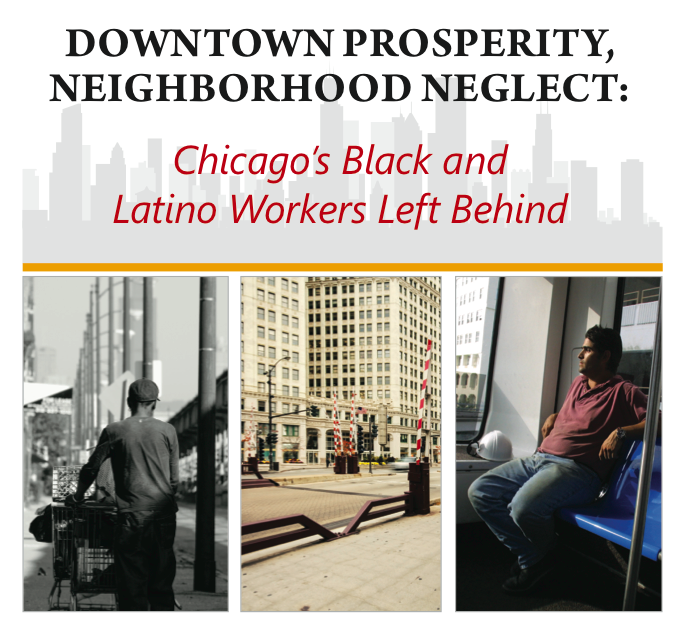
CHICAGO— Today, the Grassroots Collaborative held a press conference at City Hall to release a groundbreaking new report, “Downtown Prosperity, Neighborhood Neglect: Chicago’s Black and Latino Workers Left Behind,” detailing how the job creation benefits of TIF and city investments go almost exclusively to white, college-educated city residents or suburb-dwellers, and not to the Black and Latino residents of Chicago neighborhoods.
“Our report shows spending billions of dollars of TIF money in downtown has only gotten Chicagoans one out of four of the new jobs created. Prioritizing downtown to the exclusion of neighborhoods is an economic development strategy failing most of the people in the city,” said report lead author Eric Tellez, Research and Data Manager for the Grassroots Collaborative .
The report lays out a sharp racial disparity in downtown job gains and losses. From 2002 to 2011, Black majority city zip codes suffered a median loss of 620 downtown jobs per zip code and Latino majority city zip codes suffered a median loss of 381 downtown jobs per code; meanwhile, white majority city zip codes each added a median of 509 downtown jobs during the same period. Englewood was one of the leading neighborhoods in terms of downtown jobs lost–losing approximately 800 jobs–while Naperville gained over 800 downtown jobs.
“If the city can spend billions of taxpayer dollars to bring these jobs, the city can also structure the rules so that Chicago taxpayers can get a return on their investment,” said Charles Brown, a retired Chicago police officer, member of Action Now, and Englewood resident. “City budget cuts destroy jobs that are accessible to people in our community. That leads to other problems like foreclosures, gangs, and violence. We need to restore economic opportunities in struggling neighborhoods so that we can raise them from the bottom up.”
“The Latino community is growing. In order for Chicago to be successful, Latinos need to be successful,” said Janeth Herrera, member of the Brighton Park Neighborhood Council. “It’s wrong for the city to continue an economic development policy with our tax money that leaves out our communities.”
“Taken as a whole, the emerging research on TIF investments reveals that the program allocates tax revenue in highly uneven and inequitable ways. We need more balance, evenness and fairness in the way that TIF revenues are allocated throughout the city,” said Stephanie Farmer, Associate Professor at Roosevelt University.
The report release comes a week ahead of the October 15 Take Back Chicago town hall meeting which will draw thousands of residents, aldermen, and state legislators and launch an economic justice agenda for the city.
“There is no budget crisis. There is a crisis of priorities. Chicago cannot continue to leave Black and Latino workers out of economic development policies. A global city takes care of its neighborhoods, not just its downtown.” said Amisha Patel, Executive Director of Grassroots Collaborative.
The full report, “Downtown Prosperity, Neighborhood Neglect: Chicago’s Black and Latino Workers Left Behind,” is available on the Grassroots Collaborative website: http://thegrassrootscollaborative.org/sites/default/files/DowntownProsperityNeighborhoodNeglect.pdf
[Grassroots Collaborative is Action Now, American Friends Service Committee – Great Lakes Region, Bickerdike Redevelopment Corporation, Brighton Park Neighborhood Council, Chicago Coalition for the Homeless, Chicago Teachers Union, Enlace Chicago, Illinois Hunger Coalition, Service Employees International Union Local 73, Service Employees International Union Healthcare Illinois Indiana, Southsiders Organized for Unity and Liberation, UNITE HERE Local 1]
